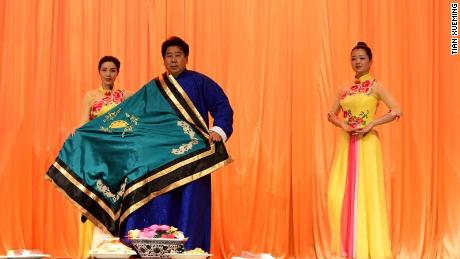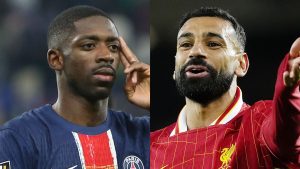The Chinese magicians calling for greater censorship of their tricks

For first-timers, Tian’s sleight-of-hand illusion is as infuriating as it is entertaining. Some audience members become hellbent on exposing the magician, by any means necessary. “Many have tried to grab my hand mid-act, wrench it open, only to find there was no ball,” says Tian.The 55-year-old refuses to give details about his tricks, citing an unbreakable magician’s code of secrecy. But this hasn’t stopped the trick from being exposed online.Millennial magician Li Yunfei posted a video of the trick on YouTube last December, using two transparent bowls to show there is no teleporting, only nimble handiwork. In seven months, that clip has racked up 1.6 million views. According to Li, trading secrets for clicks — and thus profit — has become an increasingly common practice among young Chinese magicians.”There are tens of thousands of live-streaming and video channels dedicated to exposing magic tricks,” says Li, 24, who has over 420,000 fans on Chinese video platform Tik Tok and claims to make over 1 million yuan ($145,000) per year from his videos. Tian, and other traditional Chinese magicians, have condemned this practice, even forming an association, the League in Opposition to the Revealing of Magic Secrets, to combat this trend. Many of the tricks exposed were invented by their ancestors and passed down via tight-knit, student-teacher relationships. “All magic is fake but revealing an illusion’s secrets strips its ability to amaze,” says Tian.In a bid to stop his trade from being demystified, Tian has taken an unusual approach for an artist in China.He is calling on government officials for greater censorship of magic online.Ancient secrets China’s emperors have employed magicians since at least the Han Dynasty (221-206BC). According to Tian, they would set random objects on fire to “scare criminals and commoners into obedience.” In the late 19th century, Chinese magic found worldwide recognition as Zhu Liankui, known by his stage moniker Ching Ling Foo, dazzled audiences in New York, London and other Western metropolises, performing stunts such as taking a 15-foot-pole out of his mouth.His fame reached such heights that in the early 1900s he was impersonated by New York-born William Robinson, who began presenting himself as Chung Ling Soo. Robinson shaved his head except for the hair he saved to braid into a queue, wore traditional Chinese attire and pretended not to speak English in public. The secrets behind some of Zhu’s prized illusions, such as Chinese linking rings, where solid metal rings appear to link and unlink, have been exposed online. But others, including the Water Bowl Illusion, which sees a magician whip a cloak back to unveil a giant 80-pound bowl of water, are now in the possession of select few — including Tian. The Beijing-born magician is one of the last official representatives of this dying art. In 2011, he was named an official fourth-generation inheritor of Mu-style magic — one of the two main branches of traditional Chinese magic, and the one less-tainted by foreign influence, according to Tian.That title is awarded by China’s Ministry of Culture and comes with diplomatic responsibilities. Since gaining the title, Tian has performed for a host of CCP leaders and foreign dignitaries, including most recently Russian President Vladimir Putin. The veteran magician performed in St Petersburg and Moscow three weeks ago, for cultural events organized to honor Chinese President Xi Jinping’s state visit to Russia. Tian said his state duties regularly place him on the “Excellent Party Member” list, compiled by his local Communist Party to highlight the achievements of ordinary patriotic citizens. Despite his public service, Tian’s countless petitions to and meetings with government have failed to achieve censorship of content that reveals the truth behind magic tricks. “Those officials say we are part of China’s cultural heritage but when it comes to actually passing laws banning (those who reveal magic tricks) from the internet, nothing happens,” he said. The Chinese David CopperfieldAt the height of his career, Tian was in charge of a 100-man troupe, performing stunts comparable to the likes of US counterpart David Copperfield, who became an instant celebrity in China after he seemingly walked through the Great Wall of China in 1985. While Copperfield become the first billionaire magician, Tian’s audiences have shrunk. This is partly because the brightest stages in Chinese television, such as the Lunar New Year Gala aired by Chinese state-run TV, tend to feature the younger generation of Chinese magicians keen to perform riskier new tricks. Tian and other performers from the traditional school have struggled to adapt.”I once escaped a coffin buried several meters deep in the earth, and almost choked to death,” said Tian. Since then, he hasn’t attempted high-risk stunts. The younger magicians hogging the limelight aren’t immune from having their tricks exposed.Liu Qian, arguably China’s best-known magician and a specialist in liquid transformation, was embroiled in controversy during this year’s Lunar New Year Gala.He performed a stunt in which he appeared to turn fermented mung bean milk into red wine, witnessed by two volunteers picked randomly from the audience.Shortly afterward, however, a video surfaced online that allegedly showed Liu inconspicuously switching pots mid-act. Internet not the enemyLi, the young magician, does not believe the internet is the enemy of Chinese magic. He began self-studying tricks in 2008, relying entirely on videos and English-language teaching materials posted online by US magicians. “In China’s second and third-tier cities, there are no (magic) classes, while traditional masters only have one or two disciples,” says Li, who is from a small town in the southern Chinese province of Jiangsu.Even some traditional magicians have decided to embrace the opportunities that the internet can bring. In 2007, renowned Sichuan-born magician Xiao Tian, started a television program dedicated to exposing the secrets of traditional Chinese magic. Despite protests from many of his colleagues, Xiao, who passed away in 2015, argued that only by “exposing old tricks would Chinese magic be forced to innovate new ones.” Tian rejects this idea. He believes traditional Chinese magic should be treated as intellectual property.Legally, however, this is a grey area. While China’s copyright laws do prohibit the obtaining, disclosing and selling of magic tricks through illicit means, they also allow different people to possess identical business secrets. Therefore, if someone like Li learns about a trick legitimately, through watching online videos, for example, and decides to share that information he is not exposed to a law suit.His actions would only be illegal if he had broken into a magician’s home, for example, and physically stolen an outline of the tricks. Li has never been sued. The lack of hard legal protection is why Tian emphasizes the importance of cherishing the age-old ethical codes. “When Copperfield or other great US magicians see a good trick, they don’t try to copy it or try to uncover its secrets,” says Tian. “But in China, too many magicians just want to imitate and make a quick buck.”




